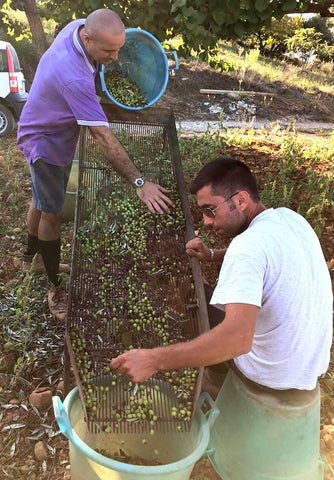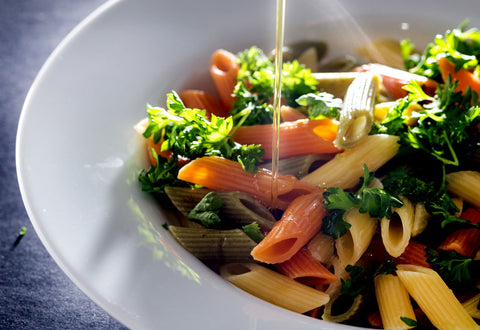
What is meant by Organic Oil
Organic Oil, What Does It Really Mean?
For some years there has been a lot of talk about organic or "BIO" products, and in our case about organic oil, but what does this term actually mean? In this article we will see what "organic oil" means, why it is synonymous with superior quality, how it is produced, how to recognize it and what its properties are.
What is Organic Olive Oil
Organic extra virgin olive oil, often abbreviated as "bio EVO oil", is a type of olive oil obtained from olives grown according to the principles of so-called organic farming. This means that the olives used to produce the oil are grown without the use of pesticides, synthetic chemical fertilizers or other harmful chemicals.
In fact, organic farming promotes sustainable cultivation methods that respect the environment and animal welfare. Organic olive groves are managed with respect for biodiversity, encouraging the conservation of soil and water resources, and reducing the impact of cultivation on the surrounding ecosystem.

How Organic EVO Oil is Produced
Organic extra virgin olive oil is produced through mechanical processes, such as cold pressing of olives, without the use of chemicals or refining processes that could alter the purity and quality of the oil. Furthermore, organic EVO oil is usually extracted from olives within a few hours of harvesting to preserve its integrity and organoleptic characteristics.

How to obtain the "Organic" Certification
The organic certification is issued by recognized bodies, which verify and certify that the EVO oil comes from organic farming in compliance with specific regulations. The "organic extra virgin olive oil" label guarantees that the product has been produced according to these standards.
Can we trust "ORGANIC" labels?
The quality and authenticity of an organic EVO oil must be confirmed through the label, certification and reputation of the producer.
Labels that say "organic" or "organic" are generally reliable when they come from certified producers and comply with specific organic farming regulations. Organic certifications must be issued by independent bodies , which have rigorous standards and which carry out periodic inspections and checks on producers, to verify compliance with organic farming standards.
As in any industry, there are cases of fraud or misleading labeling; some manufacturers may seek to take advantage of the growing demand for organic products by using misleading labels or false claims. Furthermore, it is important not to be fooled by the simple coloring in various shades of green which, although often associated in the minds of consumers with natural and healthy products, in itself is not synonymous with these virtues, nor with the reliability of the product. manufacturing company.
For these reasons, it is advisable to refer to reliable manufacturers and officially recognized certification brands. When purchasing an organic product, carefully check the label for an official certification mark.

Properties of ORGANIC Extra Virgin Olive Oil
Organic extra virgin olive oil is appreciated by many consumers for its superior quality, intense flavor and beneficial health properties .
However, it is important to note that not all organic EVO oils are the same, and the quality may vary based on the region of production, the variety of olives and the processing methods used.
How do you recognize a truly organic oil?
To recognize an organic oil, you can refer to the following indications:
-
Organic certification: Check whether the product has obtained an organic certification from a recognized body. In most countries, there are organizations that certify organic foods and place a specific mark on the label. For example, in the case of the European Union, the organic label is a green circle with white stars.
-
Label: Read the product label carefully. Organic oils usually carry indications such as "organic extra virgin olive oil", "organic EVO oil" or similar. Check to see if the label mentions organic certification or refers to sustainable, chemical-free farming practices.
-
Origin: Consider the origin of the product. Often, organic oils come from companies that openly declare their cultivation practices, and whose production chains can be traced back to the olive grove.
- Reliable Suppliers: Buy from reliable and reputed suppliers who have an established reputation. If you have doubts about the origin or quality of the product, you can also contact the manufacturer or distributor directly, so you can request additional information on the organic production of their oil.
Remember that, although these indications can help you identify an organic oil, it is always advisable to carefully read the labels and refer to the official information and specific certifications to ensure the product complies with organic standards.

Why choose organic olive oil?
There are several reasons to choose an organic extra virgin olive oil:
-
Health: Organic extra virgin olive oil is free from pesticide residues and harmful chemicals and retains all the beneficial properties of the olive, such as antioxidants and healthy fatty acids, which are important for a balanced diet and overall health .
-
Environment: As mentioned, organic oil is produced according to the principles of organic agriculture, which promotes environmental sustainability. When growing organic olives, methods and practices are used that minimize the negative impact on the surrounding ecosystem, such as soil conservation, responsible water management and promotion of biodiversity.
-
Quality: Organic extra virgin olive oil is appreciated for its superior quality. Organic olives are generally hand-harvested when they are at their ideal ripeness, and the oil is extracted using cold mechanical methods within a few hours of harvesting. This manufacturing process allows us to obtain a high quality oil, with an intense flavor and aroma.
-
Traceability: Organic EVOOs from reputable producers usually offer greater traceability. This means that you can follow the path of the oil from the plant to the olive grove and to the final production, thus allowing you to know the origin of the product and its entire production process.
- Ethics: By choosing an organic EVO oil, you support an ethical agricultural approach that promotes respect for the environment, animal welfare and the protection of consumer health. Organic agriculture is based on principles of sustainability, equity and responsibility towards future generations.
The Price of Organic Oil
It is often asked why organic EVO oil has a higher price than common olive oil. Prices can vary depending on several factors, such as the region of production, the variety of olives, the extraction method and the awareness of the specific brand, but there are some common reasons why the cost of organic oil is higher than to a non-organic oil:
-
Production cost: Organic farming requires the adoption of specific cultivation methods and practices, such as the use of organic fertilizers, biological pest control and sustainable soil management. These approaches often require more time, manual labor and attention to detail than conventional methods. As a result, production costs are higher for organic EVOOs.
-
Lower Yield: Organic farming can result in a lower yield than conventional farming. The absence of chemical pesticides and synthetic fertilizers can also lead to greater sensitivity of plants to attacks by parasites or diseases. As a result, organic producers may obtain slightly smaller quantities of olives, impacting the final cost of the oil.
-
Certification and checks: To obtain organic certification, producers must undergo regular checks and adhere to specific standards and regulations. These certification processes require additional administrative and monitoring costs which may affect the price of the product.
- Superior quality: The highly appreciated organoleptic characteristics of organic EVO oil, kept intact by the organic farming production processes, increasing its intrinsic value, and consequently the price.
We at Angimbe have decided to define our farm as "Bioethical" because, in addition to producing certified organic Sicilian extra virgin olive oil , we want to do all this in an ethical and sustainable way, respecting the environment, trying to fairly remunerate those works there, reducing carbon monoxide emissions into the atmosphere, avoiding irrigation so as not to waste water, and limiting the presence of humans in the olive grove only during the day to avoid the consumption of electricity. Finally, the processes are reduced to a minimum and are carried out with the aid of mechanical means.
All this is absolutely normal for us, we have been doing it for generations and not to gather the favors of consumers, who in this historical moment are more sensitive to these topics, but because we are aware of finding ourselves inside a unique natural reserve of its kind. , made of cork trees, animals and birds that want to live in harmony with nature, and do not accept too much the presence of man, which we at Angimbe try to limit as much as possible.
In this way, the flavors of our land arrive on your table in the most integral way possible.

If after reading this on what is meant by organic oil and its properties you have become curious about tasting our oil, you can also read the article on how to taste extra virgin olive oil , consult our recipes , or visit the our online oil shop !

